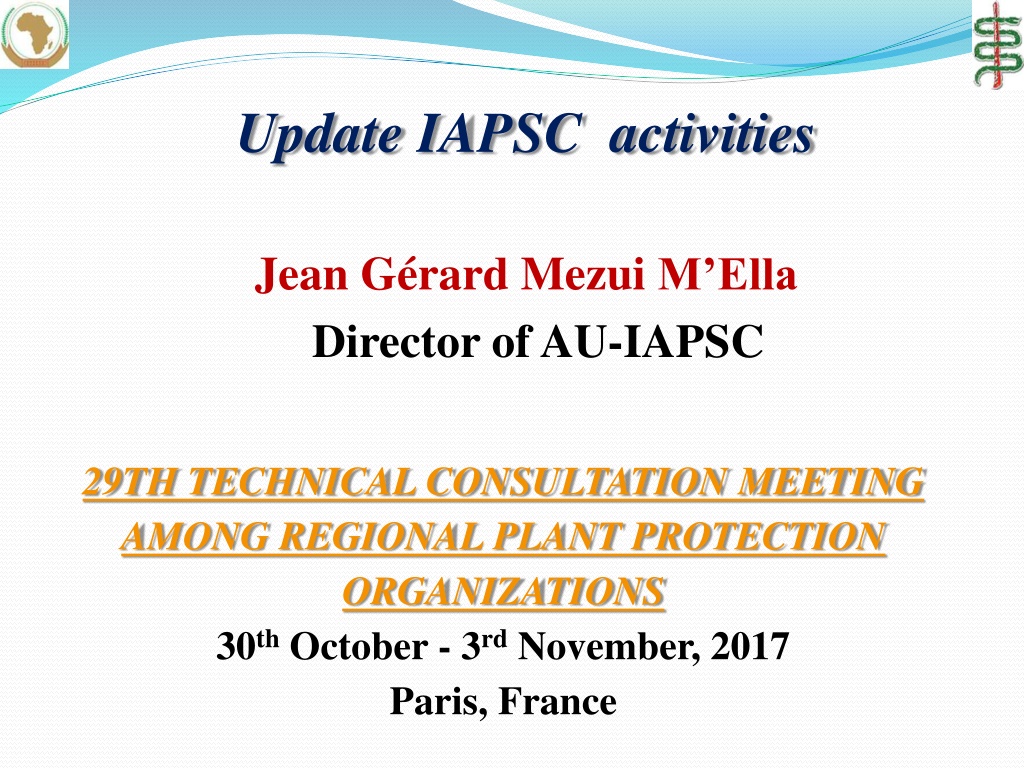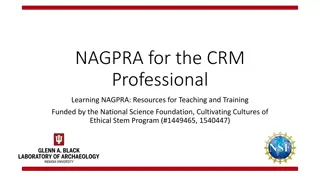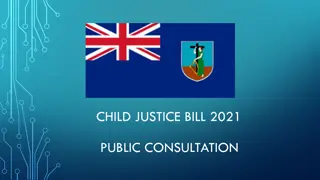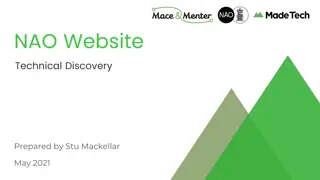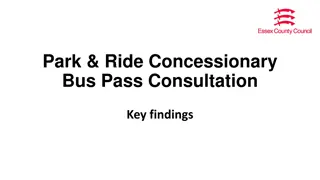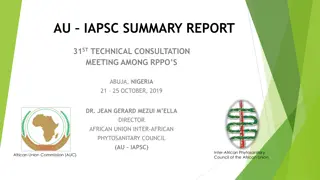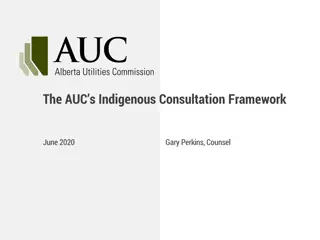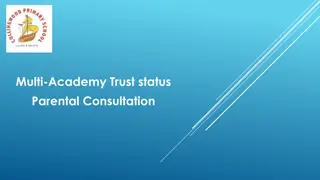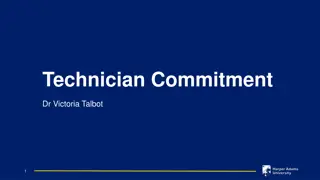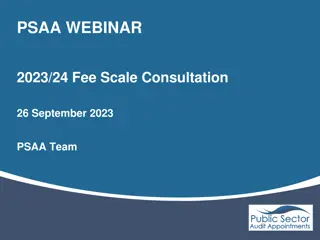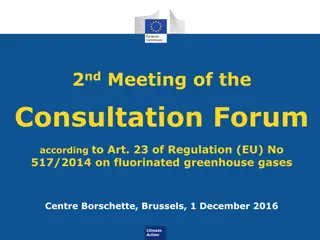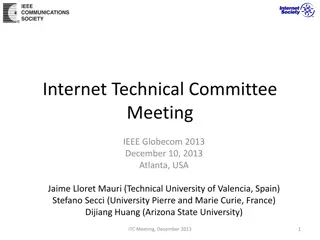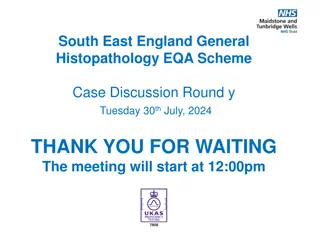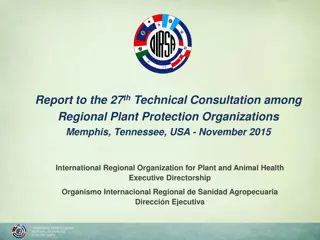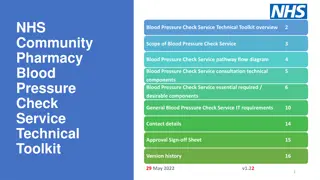Update on IAPSC Activities: Technical Consultation Meeting 2017
This update highlights the achievements and initiatives of the International Association for Phytosanitary Capacity Building (IAPSC), focusing on capacity development, strategic planning, and coordination for plant protection in Africa. It discusses the outcomes of the 29th Technical Consultation Meeting among Regional Plant Protection Organizations, emphasizing strategies for preventing and managing emerging diseases and pests. The update also covers the implementation of the 2014-2023 strategic plan, workshops, and meetings conducted by IAPSC to enhance member states' capacities in controlling plant pests and diseases.
Download Presentation

Please find below an Image/Link to download the presentation.
The content on the website is provided AS IS for your information and personal use only. It may not be sold, licensed, or shared on other websites without obtaining consent from the author. Download presentation by click this link. If you encounter any issues during the download, it is possible that the publisher has removed the file from their server.
E N D
Presentation Transcript
Update IAPSC activities Jean G rard Mezui M Ella Director of AU-IAPSC 29TH TECHNICAL CONSULTATION MEETING AMONG REGIONAL PLANT PROTECTION ORGANIZATIONS 30thOctober - 3rdNovember, 2017 Paris, France
OUTLINE Introduction Technical and capacity development achievements Participate Meetings and Workshops Emergency pests Conclusion
INTRODUCTION According to the recommendations arrived during last Steering Committees and GA held at Douala, Cameroon which enabled the IAPSC to better address plant health pertinent issues affecting Africa, IAPSC has developed the annual program within the context of the phytosanitary capacity building strategy for Africa and the recommendations from its SC and GA. Our programs were prepared in alignment with the strategy and the objectives of Rural Department of the African Union and the recommendations of SC & GA Since the last TC meeting among RPPOs, Emphasis is placed on strategies for prevention and containing emerging diseases and pests in Africa and better coordination of NPPOs activities and development of their capacities for a more consolidated approach to plant protection in and for Africa Economy and Agriculture
TECHNICAL AND CAPACITY DEVELOPMENT ACHIEVEMENTS During last year IAPSC working in the implementation of the strategic plane 2014-2023, which work to improve the building capacity of member states and help them to control the pests and diseases to increase the production and solve the food crises to help in feeding member stats people, and in addition to harmonize the position in slandered to allow them to access the international market. To do that we implement different workshops and meetings and we can put that into three main groups: General assembly and Steering Committee SPS & Control
TECHNICAL AND CAPACITY DEVELOPMENT ACHIEVEMENTS General assembly and Steering Committee: SC: We organize the two statutory meetings; i.e. the 10thSteering Committee and 27thGeneral Assembly meetings from 23 to 27 April in Cairo, Egypt with the attendance of almost the entire member states National Plant (NPPOs) representatives, some RECs and other partners (FAO, CABI, STDF, ..). The Agenda for 2017 and 2018 presented to SC member to adopt and the 2016 activities report was present. SC tacks note and prepare some recommendations to present it during GA. Protection Organizations
TECHNICAL AND CAPACITY DEVELOPMENT ACHIEVEMENTS GA : The GA took note of the progress so far achieved by IAPSC, endorsed the perspectives presented in the Steering Committee's report, and invited stakeholders and partners to make available their technical and financial implementation of plant protection projects and activities in the continent. IAPSC and its stakeholders (FAO, IPPC, NPPOs, CABI, STDF & RECs) in addition to MS were urged to ensure the sharing of information on emerging pests, establish an expert working group to develop a common pest risk analysis and develop contingency measures and to develop risk management scenarios and a joint pest risk analysis to develop risk management choices in order to develop and implement appropriate plant health in Africa. By the end of the meeting we discussed the main problem in Africa now, the Fall Army Worm and haw we must put our hand together tocontrol it. support to ensure the full
TECHNICAL AND CAPACITY DEVELOPMENT ACHIEVEMENTS SPS and Standard: In term of compliance with the International Standards for Phytosanitary Measures (ISPMs); the majority of African countries are still very weak in terms of human resources, training and intervention capacity. many side events before and during CPM meeting to harmonize the position of MS during CPM 12 which hold in South Korea. Also, we prepare different workshops to improve the building capacity of Member States. The samework done also during CODEX Alimentarial meeting. For this reasons we hold
TECHNICAL AND CAPACITY DEVELOPMENT ACHIEVEMENTS SPS and Standard: Organization of the 2017 IPPC Regional workshop for Africa , which was held from 10thto 13thin Lom Togo and attended by 22 participants from 14 member states, IPPC, FAO-RAF and IAPSC. A total of three draft standards were reviewed. These include the phytosanitary glossary, the draft standard on fumigation and the draft standard for the international movement of cut flowers. Contracting parties were encouraged to use the Online Comment Systems to input their comments and send them to the IPPC secretariat before 30thof September 2017.
TECHNICAL AND CAPACITY DEVELOPMENT ACHIEVEMENTS Harmonize Pesticides Regulationsand registrations During last 7 years we work to harmonize the regulation and registration of pesticides in MS in addition to safe using of pesticides to get with good document and by the end we hold continental meeting and with helping of expert we get final document adopted by MS and during this year in the ministerial meeting in Addis Ababa (October, 2017) the document indorsed.
TECHNICAL AND CAPACITY DEVELOPMENT ACHIEVEMENTS Integrated Pest Management (IPM) For reduce the using of pesticides and pesticides residues and their effect on Human and Animal health and also to allow African products to access the international markets we prepare for workshop and training for using Biological control as a part of control using in IPM which supposed to hold by the end of November 2017, different MS with some partiers in addition to experts were invited to participate this meeting.
TECHNICAL AND CAPACITY DEVELOPMENT ACHIEVEMENTS Migratoryand Trans-Boundary Pests During this year we hold some workshops for some very important pest problems in Africa, the 1stis migratory and inter-boundary pests. The workshop on the improvement and strengthening cooperation on migratory and inter-boundary pests between countries and RECs. It took place from 30thApril to 1stMay, 2017 in Cairo, Egypt and attended by MS in addition to RECs and some international organizations (FAO, CABI, ). The aim of the workshop was to discuss the strengthening of surveillance, preparedness and coordinated emergency responses to trans- boundary pests and the control strategies as well as measures and to provide a platform for sharing experiences and ideas and concrete, realizable, plans for future work on migrant pests to help member states and RECs to achieve its objectives of minimizing the impact of migrant pests on crop production through improved pest control strategies forpriority migrant pests.
TECHNICAL AND CAPACITY DEVELOPMENT ACHIEVEMENTS Invasiveweeds The 2ndone is review and update member states plant quarantine legislation and laws in compliance with international requirement and organized two workshops on strengthening their capacity on Alien Invasive Plants Risk Assessment and management. We hold 1st meeting in Gabon in November 2016 and the 2ndone in Malawi In September 2017 where about one for Franco- and the other for Anglo- countries, participants from member states attended in Addition to FAO and CABI and some other international organizations and RECs. By the end of these two workshops we distribute the field Guide for invasive weed prepared by IAPSC. And arrange for the draft role and regulation in plant Quarantine to control the entrance of weeds.
PARTICEPATE MEETIND AND WORKSHOPS IAPSC attended several plant protection fora, workshops and meetings organized by different stakeholders: FallArmy Worm workshops and Meetings: Workshops on Fall Army Worms which hold in Doifferent African Regions; in Nairobi, Kenya, For Anglophone countries during April 2017. DRC for Francophone countries hold in July, 2017; in Entebbe, Uganda, for East Africa region, in addition to Meeting in Douala, Cameroun. Also participate the EU-AU meeting in Rome , Italy.
EMERGENCY PESTS In addition to the main work we work also in the emergences problems in Africa, In February we went to Seychelles to monitoring the problem with black gnats and give the advice for solving and try to solve this problems and we succeed with expert to solve the problem.
EMERGENCY PESTS FallArmy Worm: Another emergency pest is the outbreak of fall army worm (Spodoptera frugiperda) in almost all regions of the continent except North Africa (Covered approximately 40 countries). The appearance of "fall armyworm" in the Southern African region unveiled the need to allocate an emergency fund by the AU Commission to AU-IAPSC to ensure timely response to eliminate its impacts on the agro-economy. Strengthening partnership and mechanisms demands to reinforce plant health governance in Africa through coordinated management of fall army worm. Awareness and advocacy raising campaigns on FAW at continental and efficient resource mobilization level are to be urgently addressed like other emerging pests. There are also very limited surveillance projects and activities being implemented by member states. efficient resource mobilization
EMERGENCY PESTS FallArmy Worm: This calls for the promotion of cooperation and resources mobilization to better be prepared for and responding to food and agricultural pests threats that could lead to crises. We work very closely with other partners and other International organization (eg. CABI, USAID, FAO and others) , We participate the workshops with USAID and FAO in Douala, Nairobi and Entebbe, to collaborate together and harmonize our work for identify and control this emergence pests. Also, with FAO we prepare TCP to help MS to control this pests and already the signature of the Technical Cooperation Program (TCP) with the FAO were take place during the 2ndConference of the Specialized Technical Committee (STC) on Agriculture, Rural Development, Water and Environment in Addis Ababa Ethiopia in October, 2017, and the work will start soon (in November 2017).
EMERGENCY PESTS The Other Emergency Pests inAfrica: Current priority pests in Africa include in Addition to Fall Army Worm: Fruit flies (Bactrocera spp) Tuta absoluta Cassava African Mosaics Virus Cassava Brown Streak Maize Necrotic Lethal Disease (MLN disease ) Banana Bunchy Top Virus Panama disease TR4 (Fusarium oxysporum) Potato Cyst Nematode (PCN) and Locusts.
CONCLUSION The Three most exciting achievements Harmonization of pesticides regulations and registrations Harmonize the comment of Commission of Phytosanitary measures (CPM) and the International Standards of Phytosanitary measures (ISPM) draft Control pest problems (ex. Fruit Flies and Quelea quelea bird) The Three key aspirations Control of Invasive Alien Species (pests and weeds) and inter boundary pests Continue the work with comment of Commission of Phytosanitary measures (CPM) and the International Standards of Phytosanitary measures (ISPM) draft Reduce the using of Chemical control and Use the Integrated pest Management (IPM) and biological control
CHALLENGE Limited financial resources especially No financial resources against emergency cases Lack of collaboration between RECs, Partners, International Organization and our office (Work together in crossing activity) Lack of sharing information (Facilitate and implement Early Detection and Rapid Response)
I Thank you Je vous remercie
